Maersk’s Shipping Lane in the Fight Against Global Warming

Global warming presents an unique set of challenges and opportunities for Maersk, the world's largest shipping line.
Global warming is expected to have significant and widespread effects across the climates and ecosystems of the planet. Accounting for over 70 percent of the Earth’s surface, perhaps no environment will be more affected than Earth’s oceans. Oceans play a vital role in the international economy with over 90% of world trade occurring through maritime transport[1]. Unfortunately, international shipping contributes to nearly 3% of the world’s greenhouse gas emissions and that impact is expected to rise to 17% by 2050[2]. Maersk, the world leader in maritime transport, is taking a leading role in mitigating the threat of global warming as well as preparing its supply chain for the dynamic future. As a responsible corporate citizen of the world, Maersk needs to continue to progress change internally and across the shipping industry while simultaneously preparing to take advantage of the changing conditions in the world’s oceans.
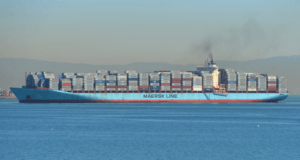 Source: www.presstelegram.com
Source: www.presstelegram.com
Global warming presents immense challenges and risks to Maersk’s worldwide operations. Rising sea levels and increased water temperatures are expected to have significant impacts on maritime shipping lanes and infrastructure. Changes to water height around the world will demand changes to port infrastructure and railways while changing the water composition and navigation routes worldwide[3]. Rising water temperatures will increasingly abet hurricanes that poise significant risks to port infrastructure and ship safety during many months of the year[4].
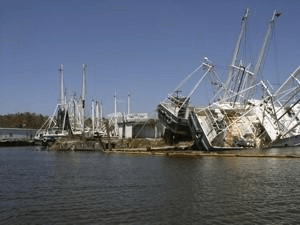 Hurricane Katrina had devastating effects on many ports in the Gulf Coast. Source: www.epa.gov
Hurricane Katrina had devastating effects on many ports in the Gulf Coast. Source: www.epa.gov
Paradoxically, rising sea levels and the melting of polar ice caps could enable greater accessibility for larger transport ships and open new passageways for Maersk to include the Northwest Passage. Studies estimate that by 2050, regular ships will be capable of navigating shipping lanes that are currently frozen year-round[5].A shipping lane through the Northwest Passage could potentially decrease the length of some Maersk routes by up to 50%[6]. These environmental changes will present an unique situation for Maersk in the future as shorter distances will increase profitability while decreasing global carbon output as much as 40%[7].
Artic Shipping Could Be A Major Change to Global Trade. Source: www.bluetraker.com
Maersk has thus far taken proactive measures to combat the effects of climate change. Internally, Maersk has begun implementing navigation techniques such as “slow steaming” to increase fuel efficiency and decrease emissions by up to 27%[8]. They are retrofitting significant portions of their shipping lines and infrastructure to further reduce environmental impact of their supply chain. Furthermore, in 2011 Maersk began developing the largest class of ship in the world called the “Triple-E” which reduces emissions by as much as 50% per container moved[9]. Maersk expects to operate over 20 Triple E ships by the end of 2018[10].
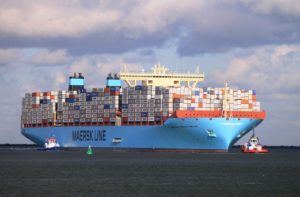 The Maersk Triple-E. Source: https://www.maersk.com
The Maersk Triple-E. Source: https://www.maersk.com
Externally, Maersk has taken an industry leading role in combating climate change. In 2014, it implemented the “Maersk Carbon Pact Challenge” which teams with other supply chain organizations and businesses to reduce emissions throughout the industry[11]. Furthermore, Maersk lobbied the industry governing body, the UN International Maritime Organisation (IMO), to regulate greenhouse gas emissions across the industry, ultimately achieving landmark regulations in July of 2017 despite significant roadblocks for many years[12].
As the effects of climate change become more pronounced and accelerated in the future, Maersk must continue providing industry leading reforms, external support, and civil engagement while maximizing opportunities presented by the changing environment. Maersk should expand its practices of slow steaming, utilizing larger ships, and retrofitting existing infrastructure while lobbying IMO to enforce these practices industry-wide. Similarly, Maersk should lobby IMO to enact a cap and trade style law that would further incentive emission reduction while enabling Maersk to take advantage of first-mover efficiencies[13]. As climate change shifts population densities and farmland worldwide, Maersk should continually evaluate its shipping lanes and ports of embarkation and debarkation. In the medium to long term, Maersk should seek to pioneer new routes through the Northwest Passage as it presents an opportunity to increase efficiency in both operating costs and environmental impact.
Moving forward, concerned citizens of the world need to question whether the call to action for change should arise from international corporations or our international governing bodies or does it not matter? Does allowing corporations to strongly influence global regulations for their own benefit present an allowable ethical dilemma in the case of Maersk? Ultimately how should the negative externalities of global trade be accounted for in a global supply chain that benefits and hurts everyone?
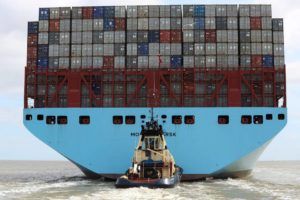
Word Count: 715
_____________________________________________________________________________________________________
[1] McLauchlan, Peter A; Stephens, Ben. Journal of Transportation Law, Logistics, and Policy; Gaithersburg Vol. 83, Iss. 3, (Third Quarter 2016): 201-216.
[2] Adler, Ben. 2017. “Shipping Is A Big Contributor To Climate Change. So Why Is It Being Left Out Of The Paris Deal?”. Grist. http://grist.org/climate-energy/shipping-is-a-big-contributor-to-climate-change-so-why-is-it-being-left-out-of-the-paris-deal/, accessed November 2017.
[3] “Potential Impacts Of Climate Change On U.S. Transportation”. 2017. Transportation Research Board Special Report, no. 290: 5-11.
[4] “Climate Impacts On Transportation”. 2017. Climate Change Impacts. https://19january2017snapshot.epa.gov/climate-impacts/climate-impacts-transportation_.html#Marine.
[5] Levins, Cory. 2017. “How Global Warming Affects Traditional Shipping Routes”. Airseacontainers.Com. http://www.airseacontainers.com/blog/how-global-warming-is-affecting-shipping-routes/.
[6] Ibid.
[7] Ibid.
[8] “Shipping And Climate Change | Transport & Environment”. 2017. Transportenvironment.Org. https://www.transportenvironment.org/what-we-do/shipping/shipping-and-climate-change.
[9] “Triple-E”. 2017. Maersk. https://www.maersk.com/explore/fleet/triple-e/the-hard-facts.
[10] Ibid.
[11] “Partnering To Win”. 2017. Maersk. Accessed November 15. https://www.maerskline.com/en/about/sustainability/partnering-to-win.
[12] “Maersk Leads Shipping Industry Developing Fuels From Waste”. 2012. Financial Post. http://business.financialpost.com/commodities/energy/maersk-leads-shipping-industry-developing-fuels-from-waste.
[13] Cullinane, Kevin. 2012. Transport And Climate Change. 2nd ed. Loughborough: Emerald Group Publishing Limited.



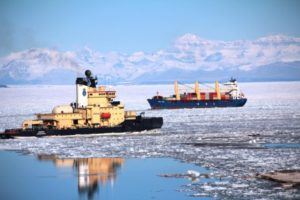
My main concern about the approach Maersk is following is that it is mainly focused on measures that are economically interesting for them (e.g. increasing efficiency, which usually reduces the energy bill) or that provide them with a competitive advantage (e.g. regulations that favor more efficient players, as they are). However, this strategy, which could be optimal for Maersk, might not be so for society.
What if efficiency improvements no longer make economic sense in the future given the required investments? Should we trust that Maersk will continue to do them? What if regulations that favor more efficient players end up reducing competition by putting out of business several players and therefore give more power to remaining players to impose the policies that favor them most?
Legislators should be very aware of large companies’ potential to lobby in favor of certain rules and should try to develop incentives that push polluting companies to improve even if the enhancements do not pay by themselves.
One aspect of this article that was particularly interesting was the impacts of melting in the Northwest passage, to shorten the shipping routes. However, the impact of this are not solely positive; the melting represents a tangible side effect of climate change and the industry is already oversupplied by capacity.
I believe that many of the practices that Maersk is implemented will be adopted by their competitors without regulation from the IMP, given the changing landscape these fuel and cost saving measures will become the norm.
You raise some interesting questions around the role of corporations vice international governing bodies on who should be pushing for more stringent environmental policies. My first reaction would be to say it does not matter, but on deeper reflection, I realise it is maybe not so simple. The suggestions that Maersk has made and has implemented appear to be objectively better for the environment with no obvious negative side effects or incentives for corporations, however it is important to ensure all suggestions by corporations are adequately examined to ensure no inadvertent (or even deliberate) ill incentives. I don’t think there is an ethical issue with corporations such as Maersk lobbying for environmental policies as long as there is healthy debate around what is being suggested. I’m sure there are benefits in marketing from such policies, but I don’t see there being a way that they can develop more of a competitive advantage than others with such policies and therefore the overall winner is the environment which must surely be a good thing.
What I found interesting is that while to flight against global warming leads to additional capital expenses to many companies, it’s economically beneficial for Maersk. I realized that it is optimal to align corporate social responsibilities with economic interests. But I started to think whether it is the economic benefits that push these changes or it is the environmental initiatives. In addition, for other companies in the value chain such as oil producers, trading houses, and refineries, there might not be sufficient incentives for them to drive the change.
Interesting article!
One thing I found shocking was the research published on how strong is lobbying of the shipping industry executives on climate change policies. The IMO environmental committee had 31% of nations which were represented in part by direct business interests, the only UN agency to allow such extensive corporate representation in the policy-making process [1].
Hence, maybe one solution is for investors to start playing a bigger role and penalizing companies that do not adhere to strict climate change standards. With the increasing allocation of capital to impact investing and the focus of several large investment firms on Environmental, Social and Governance Diligence (ESG), we can hope that market forces will ensure that the industry starts to self-regulate itself. However, this can be a painfully slow process and it is up to us, the shareholders to place higher importance on these issues while allocating capital to various fund managers.
[1] https://influencemap.org/report/Corporate-capture-of-the-IMO-902bf81c05a0591c551f965020623fda
Very interesting article addressing very pertinent questions about how to manage climate change. One figure that caught my eye from your article was the data point that shipping contributes to only 3% of global GHG emissions today but is expected to increase to 17% by 2050. It makes think that given the lack of overall contribution to climate change, Maersk should purse a leadership role outside of the shipping industry (attempting to influence energy and agriculture companies who make up the majority of GHG emissions) in order to have a stronger long-term impact. At the end of the day, the biggest sources of emissions need to addressed to meaningfully improve probability that we prevent global temperature from rising. I was also surprised that experts expect shipping’s percentage contribution to GHG emissions to increase over 5x through next 30 years. What is driving this? Is there an underlying assumption around a global shift away from non-renewable energy sources?